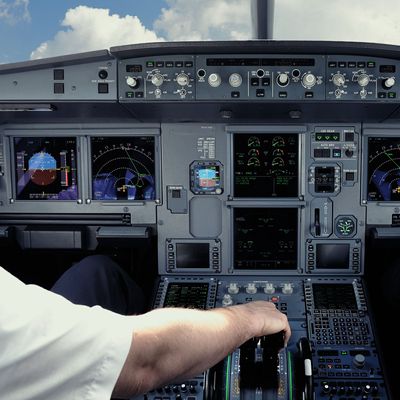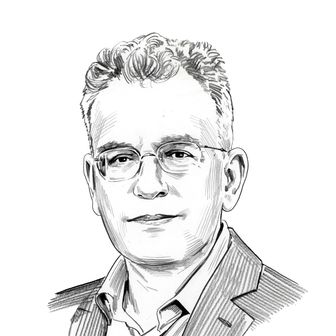
Joe*, early 40s
Commercial pilot
New York, NY
I don’t remember what I thought flying would be like when I was a kid. You think about flying the actual airplane and the money. Everyone thinks you’re going to make a bunch of money. Which, long story short, some do, some don’t. You definitely don’t think about the nights in Buffalo.
I joined an airline in 2000. There was a lot of growth before 9/11, and a fair amount of optimism because everything was going so well. If you were a flight instructor you were moving up to regionals, if you were in the regionals, you were moving up to the majors.
September 11 obviously changed that. It all went to a standstill. Some companies did go out of business. Soon after, the mandatory retirement age was raised from 60 to 65, and that delayed a lot of retirements. Now, four years since the 65-year-olds started retiring, there’s more optimism. Companies are doing well, airlines are at record profits.
The major airlines — that’s the endgame for everybody. The best pay, the best schedules, the most variety, the better cities. You’re not going to Corpus Christi, Texas, every week. You’re going to San Diego or to London. I work 14 or 15 days a month. I always joke that it’s the best-paying part-time job you can get.
But it all comes down to seniority. When you’re the low man on the totem pole there’s less good stuff to choose from. Seniority can determine your schedule, it determines whether you can be a captain or not. When I say it’s everything in the airline business, it is everything.
We bid on schedules monthly. Most companies use a preferential bidding system. So you might say, “I want the 11th and the 15th off, I want to show up in the afternoon, and I want to be done before 5 p.m. And I like San Francisco.” You put those preferences in, and, based on your seniority, you get trips that match that. If there aren’t trips that match your preferences, you get awarded a trip out of whatever’s left.
I put it in my bid every month, and if I get the route I like, great, and if I don’t, great, it doesn’t matter. Somehow it got into the public that everyone flies the same route. Airlines joke about that because that’s not really a thing. It would get boring to me, going to the same place every time.
I fly an Airbus — A320s. I’m a first officer, so I mainly co-pilot. The captain, he’s in charge. But the actual flying skills and flying duty, it’s pretty interchangeable. The captain can take control whenever he wants, but each guy can do the job. Everybody is trained in what the other guy does. You switch. There’s no set way to do it, but we switch every leg.
You get to know some people because you’ve flown with them multiple times. I can pretty much get along with anybody. If I don’t, they don’t know I think they’re an asshole. Most — 99.9 percent — fly to company standards and protocol. There’s a handful out there who don’t, and that can be a problem. You never know what that person’s thinking.
A lot of pilots are type A and don’t like being told what to do. I’m not so type A, and I figure if someone’s telling me what to do, it’s less for me to think about. But usually it’s just personality or procedural conflict. Some guys are just rude or mean. There’s one guy known in Kennedy as a jackass. Everyone says if you are a jackass to him as soon as you meet him, he’s fine the rest of the trip. But if you don’t do that, he’s a jackass.
Then there’s some people who have no personality. There’s one guy I’ve flown with trans-con a few times. Six hours in-flight, and we had maybe seven minutes of non-task-related conversation. That makes for a long flight!
You learn a lot about people. It’s Taxicab Confessions sometimes, whether you like it or not. Especially talking about income. Guys will say, “Oh yeah I made $350,ooo last year,” or “I made $250,ooo.” I think in normal nine-to-five jobs, people are very discreet. You have no idea what the guy in the cubicle next to you is making. There’s no secrets among airline pilots.
You talk about the wife. I had one guy — actually, more than one guy — go “Hey, you want to see pictures of my wife?” You go, “Uh … sure?” Sometimes they’re naked pictures or, “Hey, I was banging this girl” and you’re just like, “Dude … I don’t even know your name.” You get people off on religious tangents, political tangents. A lot of people have a second businesses, so you talk about that. You run into people with all kinds of hobbies — some are interesting, some aren’t. You name it, man. I’ve probably heard it all.
One guy, years and years ago, apparently got mixed up with cocaine and went to work. The first officer went down to the chief pilot and said, “I don’t know what’s wrong with this dude, but something’s up.” The guy ended up in rehab. He’s living a good life now. He’s at another airline and he’s clean.
I know another guy, he never flew high, but he got mixed up with meth and he realized he had a problem and he self-disclosed. It’s the employee assistance program — EAP. It’s not just for substances. It’s: “Hey, I’ve got anxiety,” or, “I’ve got this going on at home, I just can’t focus on work.” That kind of thing. The company I work for, we’re really good. They pull you off the job, put you in rehab, and get you straight. As long you say, “Hey, I have a problem.”
When I started working, you were lucky if you had the six basic instruments and a digital radio. Now planes have touchscreens and moving maps and serious weather uplinks and things like that. Avionics, the plane’s electronic equipment, are completely upgraded now. But little things like starting the engine — it’s a chore compared to some airplanes. You’ve got to hit this knob and this knob and introduce fuel at a certain time. If you had a fully digital engine computer, you just hit the start button and it does everything for you.
Single-engine planes and small twins, believe it or not, are light-years ahead in airline technology. It’s because once an airplane design is certified, there’s only so much that can change without requiring a separate “type rating.” A 737 was designed in the ‘60s. It could be a whole lot more automated, systems-wise, than it is, but to maintain that 737-type rating it has to have some resemblance to what it did in the ‘60s.
There really isn’t a whole lot of judgment given to the computers. At least the airplanes that I’ve flown. A lot of it is just reacting to what is given to you. Still, every now and then you look back and go, “Holy shit, that would have been better if I’d done something different.” There’s one that always sticks out in my mind. We were getting close to an airport approach, and there was a storm approaching to the west. We had planned in the computer to fly past the airport, and then land with a headwind. As we got closer to the airport, air-traffic control told us to expect a straight-in approach, where you land straight and don’t go past the airport.
We quickly reprogrammed the computer. We were higher than we should have been for the straight-in approach. We had to work to get it down. When we were at about 1,000 feet, we hit a pretty innocuous-looking cloud. The airplane rolled probably 45 degrees to the left. I was flying, and I had the controls full to the right, but the plane wasn’t rolling back. It was maintaining the left bank. So I stomped on the rudder, which helps you turn a little bit. That brought the airplane upright. It was smooth the rest of the way down.
Self-preservation kicks in and you do what you have to do. Like Sully landing in the river! If you’re at altitude, at 35,000 feet, you’ve got probably 25 to 30 minutes of gliding time. That’s a lot of time to plan and find a place to land. East of the Rockies there are a surprising amount of airports you can land at if you had to. You’ve also got freeways and fields. Any relatively flat space without any trees or telephone poles or wires. When self-preservation kicks in, you’ll do what you have to do.
I’ve never encountered any terrorist threats or anything like that. It’s usually drunks or health problems, which are in the back of the airplane. Legally, people don’t die on the airplane. It’s something to do with the FBI and crossing state lines or some crap. It’s not until you land that they’re declared dead.
You definitely see some cool things. Sunrise, sunset. Moonrise, that’s always kind of weird, and you’ll think, “What the hell am I looking at?” Because it doesn’t look like a moon, it’s gigantic and orange, or partially obscured by a cloud. What the hell is that? “Oh, it’s just the damn moon.”
*Name has been changed.
